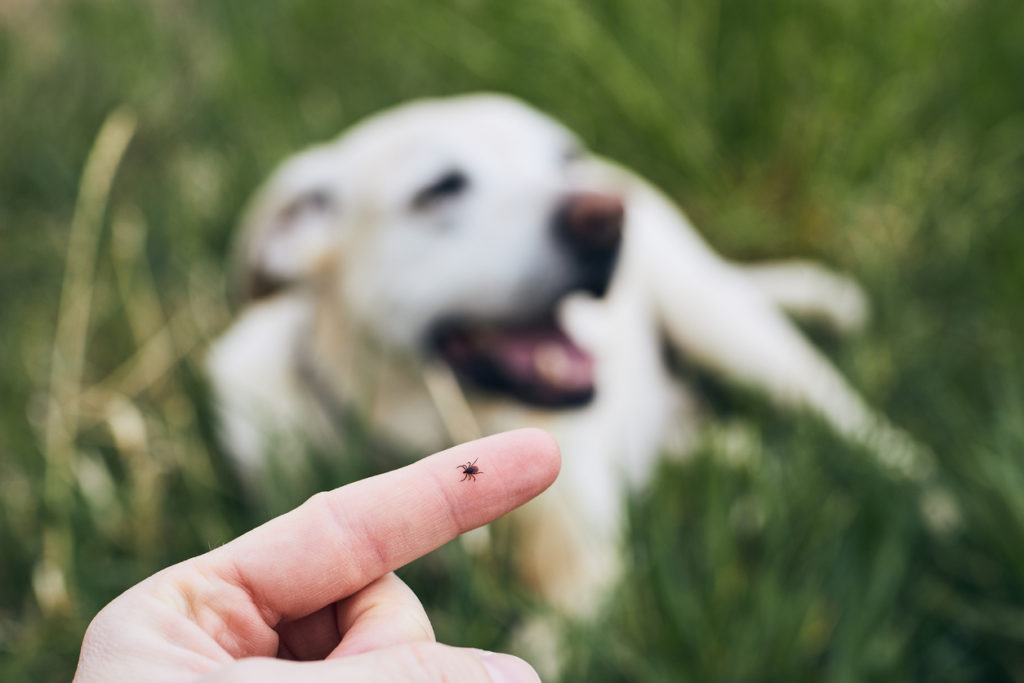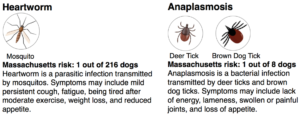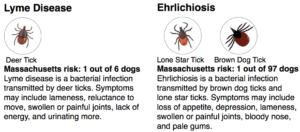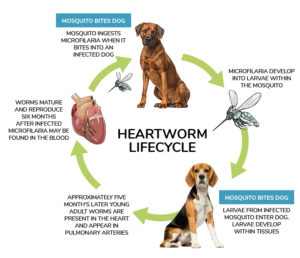Adding a pet to your family can be a rewarding experience, but it's important to…

Parasite Testing and Prevention
Understanding Parasite Testing & Prevention
Internal parasites may be small, but these tiny creatures can wreak havoc on your pet’s health. As a pet owner, it’s important you understand how you can prevent and test for these harmful parasites and any infections they can cause.
What is the Heartworm and Tickborne Disease Panel and why is it important?
Also called the “4DX”, “Snap test” or “HLEA”, this 10-minute in-house blood test screens your pet for 4 common infectious diseases in Western Massachusetts. It’s important to screen for these diseases as even pets who appear healthy are commonly positive, and it is usually more beneficial for the pet to treat the infection before they show signs of illness. Even if your dog is on preventatives year-round as recommended, or lives in an urban environment, the high infection incidence in our area means this test is still an important part of their annual wellness testing.


What is a Microscopic Fecal Parasite Test and why is it important?
A fecal examination is a lab test that screens for microscopic eggs and parasites in your pet’s intestinal tract. Did you know that only two of our several common pet parasites can be seen with the naked eye? Did you know that any of these intestinal parasites can be present in your pet without you ever seeing them or seeing any signs of the illness? Did you know some of these parasites can be transmitted to humans? Some species of parasites lay eggs that are viable in the soil for months or even years, which means even a curious sniff of your shoe or licking their own feet after going outside can transfer intestinal parasites to your pet! This is why annual testing and parasite prevention is so important.
What can I use to prevent parasites?
Internal parasites: Heartworms and Intestinal Worms
A heartworm pill, given once monthly, contains medication that prevents common intestinal parasites and heartworm from infecting your pet. The American Heartworm Society recommends giving this prevention all year round no matter what climate you live in. Not only does giving prevention make your pet safer, but it can save you significant treatment costs. While heartworm pills cost an average of $90–$130 per year, heartworm diagnosis and treatment costs easily $2500 or more and are not by any means a guarantee– after all, it involves killing foot-long worms that are actually living in and around the dog’s heart, making embolism a significant risk. These pills are a prescription product and must be sold or prescribed to you by your veterinarian. The prescription requires you do not lapse in prevention for more than 60 days, and that a heartworm test has been performed within the past year.
External parasites: Fleas and Ticks (and sometimes mites, too!)
A flea and tick prevention contains medications that prevents or limits an external parasite (such as a tick OR flea), from feeding on your pet and transmitting diseases (such as Lyme, Anaplasma, Bartonella, and even tapeworms!). There has never been a more convenient time to treat external parasites with products that range from oral chewables, collars, and topicals. Always discuss what products you would like to use with your veterinarian, as some over the counter products can be ineffective and hazardous, and oral chewables should not be given to a pet with a history of seizures or tremors. If your pet is suffering from mange, your vet may recommend you switch what preventative you use to better target the offending parasite. Additionally, it is recommended in our area to continue flea & tick prevention all year round as cold weather will not kill ticks AND fleas can easily survive indoors in the winter. Ticks may be less active during colder temperatures, but during warmer winter days, it is very possible to encourage and get bitten by ticks.




